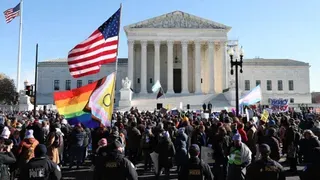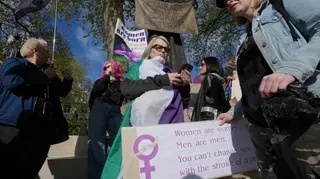
Feb 10
The Supreme Court Could Revisit Marriage Equality, and Here's How It Might Play Out
Kilian Melloy READ TIME: 5 MIN.
The election of Donald Trump to a second term has sharpened fears that emboldened anti-LGBTQ+ activists could challenge marriage equality, leading to a highly partisan Supreme Court revisiting Obergefell v. Hodges, the 2015 ruling that legalized same-sex marriage nationally. There's already precedent: the Court's 2021 upending of Roe v. Wade, a reversal that struck down a precedent and eradicated a Constitutional right rooted in half a century of settled law.
While the exact "who" and "when" of such an eventuality are yet to be discovered, Newsweek consulted legal experts to explore the "how" – and to ask whether even a bench as right-wing as the current Court would actually follow through on a course of action for which two of its jurists have openly advocated.
First off, though the Court has seemingly invited such a challenge through remarks made by two of its most right-wing members, Clarence Thomas and Samuel Alito, it cannot simply decide on its own to revisit the 2015 ruling.
Rather, the issue would have to be "specifically raised," in the language of "Lawrence Friedman, a law professor at Boston's New England Law and author of 'Modern Constitutional Law,'" Newsweek relayed.
"For the Court to overturn its decision in Obergefell, it would have to hear a case in which a party is arguing for that result," the magazine quoted Friedman saying.
"Friedman said if such a case were to arrive at the Court, the argument for overturning Obergefell would likely track with what Thomas outlined in a concurring opinion in the ruling in Dobbs v. Jackson Women's Health Organization, the case that overturned Roe," Newsweek recounted.
Thomas, recalled Friedman, proposed the theory "that the due process clause of the 14th Amendment does not contemplate the protection of a right of a consenting adult to marry a person of the same sex," with Thomas declaring "that he does not believe due process protects any such interest."
Nor, the article noted, does Thomas believe that consenting adults have other rights – including the right of married heterosexual couples to have access to various means of birth control, or for same-sex couples to have sex legally at all.
During his first term, Trump installed three of the Court's six hard-right jurists, cementing a super-majority for decades – possibly generations – to come. Indeed, it was during the Biden years that the Court abolished the nationally recognized legal right of women to choose whether or not to continue a pregnancy, returning the issue to the states.
"Those six justices have made quite clear their willingness to overrule decisions with which they disagree, most obviously on the issues of abortion and affirmative action," University of Chicago's Geoffrey Stone, whose speciality is Constitutional law, told Newsweek.
Even so, Stone added, that doesn't necessarily mean the Court would abolish marriage equality if it got the chance.
Said the legal expert, "I hope that at least some of these justices care about the credibility of the Court as an institution as not driven by partisanship or by the personal or political views of the justices when they disagree with precedent."
The Court has already sunk in approval ratings, with polls showing that a majority of Americans believe the jurists on the bench are more likely to cater to ideology and their own political convictions than to hew to the role of interpreting the law.
That perception, and the Court's loss of esteem, has largely been driven by its overturning of Roe v. Wade, as well as its rulings on issues like presidential immunity.
Stone ventured the "cautious guess... that enough of the Republican-appointed justices will want to maintain the understanding of the Court as a non-political body that at least two of them (and perhaps more) will decline to overrule Obergefell" in the event that a case directly challenging the 2015 ruling should land on its docket.
Such an eventuality is highly possible, however. One indication of a political climate likely to throw up such a challenge is the recent approval by Republican state representatives in Idaho of a resolution to call on the Supreme Court to roll back national equal marriage rights.
Even in that instance, the measure did not have unanimous support, with 15 GOP state lawmakers voting against the resolution along with the chamber's nine Democratic members. Still, a majority of Republicans threw their support behind the measure, with the resolution – which is symbolic, carrying no force of law and requiring no action from the Court – sailing through on a 46-24 vote.
"This Idaho resolution seems purely symbolic or expressive," another expert – "Kate Shaw, a law professor at the University of Pennsylvania Carey Law School and constitutional law scholar" – explained to Newsweek.
"But if a state sought to go further – to pass or enforce a law that limited marriage to opposite-sex couples, in clear violation of Obergefell – a challenge to that law could quickly make its way to the Supreme Court," Shaw added.
Such actions from GOP lawmakers in states across the country could follow the Idaho lawmakers' actions, given that the Idaho resolution was due, at least in part, to the efforts of an out-of-state group – namely, the Massachusetts-based MassResistance, which has, since the mid-1990s, worked to prevent marriage equality.
MassResistance has been declared a hate group by the Southern Poverty Law Center for its work against marriage equality and its rhetoric suggesting that LGBTQ+ people are pedophiles who "lure" children into somehow becoming queer through anti-suicide efforts.
The precedent of the Supreme Court revisiting settled law with such unsettling effect helped propel the passage of the Respect for Marriage Act, a 2021 law designed to serve as a bulwark against a renewed attack on same-sex families from the highest echelons of the judicial branch.
However, the Respect for Marriage Act cannot completely shield American families from the harm that a Supreme Court rollback of their marital rights would inflict. For one thing, as Time Magazine noted when the law to protect marriage was signed, "the new law doesn't prevent states from refusing to license the unions."
As happened with abortion, unenforceable state laws targeting marriage equality, held in abeyance since the Supreme Court's 2015 ruling by the Court's federal scope, could spring back to life with full legal force in the event that the Court yanks the right to full legal marriage equality from same-sex American families.
There are "35 states that currently have inactive bans on same-sex marriage," with those states "largely concentrated in the American South, from Texas to Florida," Time said.
Families at risk aren't waiting around and relying on hope that their rights will remain intact; Trump's election galvanized many to action, not just in the arena of marriage but also parenthood through IVF, another target of the hard right.
Kilian Melloy serves as EDGE Media Network's Associate Arts Editor and Staff Contributor. His professional memberships include the National Lesbian & Gay Journalists Association, the Boston Online Film Critics Association, The Gay and Lesbian Entertainment Critics Association, and the Boston Theater Critics Association's Elliot Norton Awards Committee.







